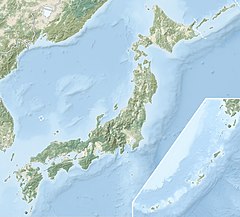Shiraho Saonetabaru Cave Ruins
白保竿根田原洞穴遺跡 | |
| Location | Ishigaki Island of the Yaeyama Islands |
|---|---|
| Region | Japan |
| Coordinates | 24°22′57″N 124°12′21″E / 24.38250°N 124.20583°E |
Shiraho Saonetabaru Cave Ruins (白保竿根田原洞穴遺跡, Shiraho Saonetabaru Dōketsu Iseki) is a paleoanthropological site located on Ishigaki Island of the Yaeyama Islands in Japan. Shiraho Saonetabaru is a limestone cave.[1]
It was discovered in 2007 when plans for the New Ishigaki Airport were being developed.[1] Remains of human heads, feet and arms were found, in all 9 bone fossils, by the Okinawa Limestone Cave Association between 2007 and 2009,[2] and three human samples were dated to between 20,000-16,000 years before present.[3] In the ruins were also found bones from wild boar and birds (one animal bone calibrated at 12,000 BP[3]), while during the three months in 2011 were discovered approximately 300 human bones from the stratum between 24,000-20,000 years old.[4]
In 2015, researchers from the University of the Ryukyus and University of Tokyo succeeded in radiocarbon dating three out of five of the bones tested. The three bones yielded the following dates: (20,030 to 18,100 years BP), (22,890 to 22,400 years BP) and (24,990 to 24,210 years BP).[1]
The investigation held between 2012 and 2016 found more than 1,000 human fragments from at least 19 human skeletons. The "No. 4" almost full skeleton was dated about 27,000 BP,[5] being the oldest full skeleton discovered in East Asia and several thousand years older than the skeletons of the Minatogawa people.[6] Due to the skeletons' postures, the site has been confirmed as the first graveyard in the Paleolithic age in Japan.[5]
See also[edit]
References[edit]
- ^ a b c Kaifu, Yousuke; et al. (2015). "Pleistocene Seafaring and Colonization of the Ryukyu Islands, Southwestern Japan". In Kaifu, Yousuke; et al. (eds.). Emergence and Diversity of Modern Human Behavior in Paleolithic Asia. Texas A&M University Press.
- ^ "石器使わなかった旧石器人? 石垣島・白保竿根田原洞穴". Asahi Shinbun (in Japanese). Tokyo, Japan: Asahi Shimbun Company Shinbun. 6 Nov 2011. Retrieved 2013-04-01.
- ^ a b Nakagawa, Ryohei (2010). "Pleistocene human remains from Shiraho-Saonetabaru Cave on Ishigaki Island, Okinawa, Japan, and their radiocarbon dating". Anthropological Science. 118 (3). The Anthropological Society of Nippon. Retrieved 6 August 2017.
- ^ "24000 year-old human remains discovered at Shiraho Saonetabaru Cave Ruins in Ishigaki City". Ryūkyū Shimpō. 11 November 2011. Retrieved 6 August 2017.
- ^ a b "Shiraho Saonetabaru Cave Ruins confirmed as first graveyard during Old Stone Age in the country". Ryūkyū Shimpō. 20 May 2017. Retrieved 6 August 2017.
- ^ Gaisho Yonekura (1 July 2016). "Discovery of oldest East Asian full-body human skeleton at Shiraho Saonetabaru Cave Ruins". Ryūkyū Shimpō. Retrieved 6 August 2017.

